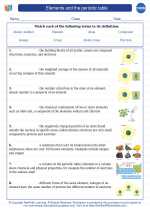1. Introduction to Genetics
Genetics is the study of genes, DNA, and heredity. Genes are units of heredity that are passed from parents to offspring and determine an organism's traits. DNA, or deoxyribonucleic acid, is the molecule that carries genetic information. Heredity refers to the passing of traits from parents to offspring.
2. Gregor Mendel and the Laws of Inheritance
Gregor Mendel, an Austrian monk, is known as the father of genetics. He conducted experiments with pea plants and established the fundamental principles of inheritance. Mendel's laws, including the law of segregation and the law of independent assortment, laid the foundation for modern genetics.
3. DNA and Genetic Material
DNA is a double-stranded molecule that contains the genetic instructions for the development, functioning, growth, and reproduction of all known organisms. It consists of four nucleotide bases: adenine (A), thymine (T), cytosine (C), and guanine (G). The sequence of these bases forms the genetic code.
4. Genetic Variation and Mutations
Genetic variation refers to the differences in DNA sequences among individuals within a population. Mutations are the ultimate source of genetic variation and can be caused by various factors such as environmental influences, errors in DNA replication, or exposure to mutagens.
5. Inheritance Patterns
Inheritance patterns describe how traits are passed from parents to offspring. These patterns include autosomal inheritance, sex-linked inheritance, incomplete dominance, codominance, and polygenic inheritance. Understanding these patterns is essential for predicting the likelihood of certain traits in offspring.
6. Modern Genetics and Biotechnology
Advances in genetics have led to the development of biotechnology, including genetic engineering, gene therapy, and the study of genomics. These fields have significant implications for medicine, agriculture, and various other industries.
7. Genetic Disorders
Genetic disorders result from abnormalities in an individual's genetic material, and they can be inherited or arise from spontaneous mutations. Examples of genetic disorders include cystic fibrosis, sickle cell anemia, Huntington's disease, and Down syndrome.
8. Ethical and Social Implications of Genetics
The study of genetics raises important ethical and social issues, including genetic testing, privacy concerns, genetic discrimination, and the potential for designer babies. It's crucial to consider these implications as genetic technologies continue to advance.
.◂Chemistry Worksheets and Study Guides High School. Elements and the periodic table

 Worksheet/Answer key
Worksheet/Answer key
 Worksheet/Answer key
Worksheet/Answer key
 Vocabulary/Answer key
Vocabulary/Answer key
 Vocabulary/Answer key
Vocabulary/Answer key
 Vocabulary/Answer key
Vocabulary/Answer key
